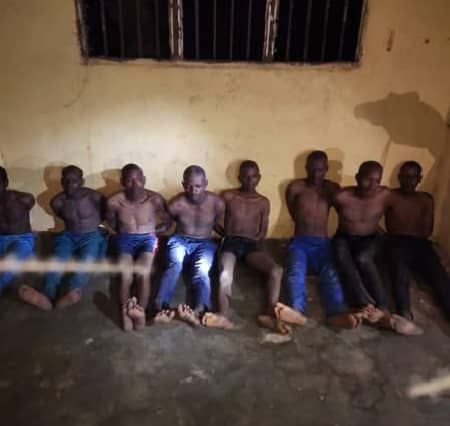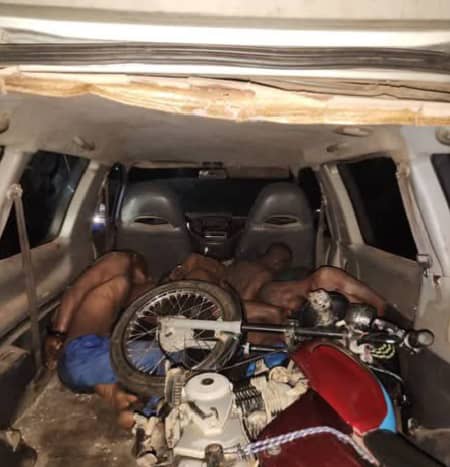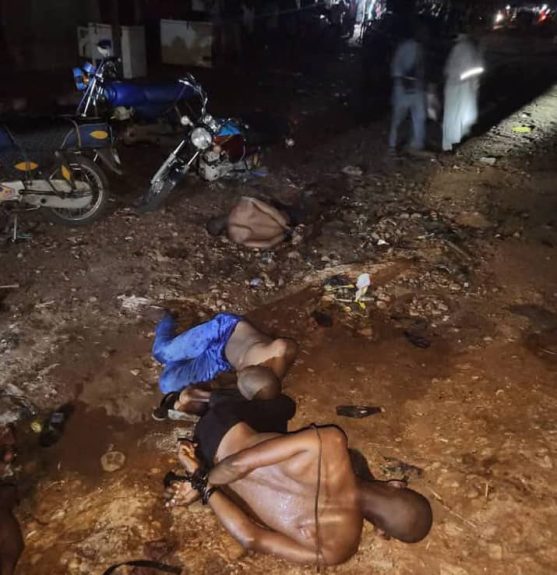
Daniel Otera
Troops of the 22 Armoured Brigade of the Nigerian Army have arrested eight suspected kidnappers and rescued two abducted victims during a tactical operation in Patigi Local Government Area of Kwara State.
The military raid, conducted on Saturday, targeted a known hideout near Latandaji Village, a quiet agrarian community increasingly vulnerable to rural banditry.
Acting on what the army described as “credible intelligence”, the operation led to the recovery of two motorcycles and two expended cartridges believed to have been used by the suspects.
One of the suspects, identified as Mohammed Mohammed, sustained gunshot injuries and was evacuated to Bachita Teaching Hospital for treatment.

The rescued victims, Amos Moses and Philip Michael, have since been reunited with their families. The eight arrested suspects remain in military custody pending further investigation and possible prosecution by the appropriate authorities.
While the army has praised the operation as part of its ongoing crackdown on crime in Kwara, the development underscores a more disturbing trend: the north-central region is becoming increasingly exposed to the spill-over of armed violence previously concentrated in Nigeria’s far North.

Historically considered a relatively stable part of the country, Kwara State has begun showing signs of deteriorating security. In May 2025, Vanguard reported a spike in cases of kidnapping and banditry, particularly in the Northern and Southern Senatorial Districts.
The report indicated that criminal gangs, fleeing military pressure in states like Niger, Kaduna, and Zamfara, have crossed into Kwara and are establishing camps in remote communities.
Baruten and Kaiama LGAs in Kwara North were specifically cited as high-risk zones, with residents frequently falling victim to abductions and extortion. Security analysts warn that if proactive measures are not taken, Kwara could serve as a corridor for criminal elements regrouping after being flushed out from more volatile zones.
Patigi, the site of the recent military raid, lies at a strategic intersection between Niger, Kogi, and Kwara states. Though known for its fertile rice fields and thriving fishing economy, the area has increasingly drawn the attention of criminal groups due to its porous borders, difficult terrain, and limited law enforcement presence.
In January 2025, a report by the Nigeria Security and Civil Defence Corps (NSCDC) identified Patigi as one of three LGAs in Kwara with “emerging high-risk” status due to rising activity by armed groups. The warning came amidst broader concerns about the migration of insurgents from neighbouring states into relatively safer territories across the Middle Belt.
The establishment of Forward Operating Bases (FOBs) in places like Patigi forms part of the federal government’s military response to this trend. In the 2024 national budget, over ₦3.25 trillion more than 12 per cent of total federal spending was allocated to defence and internal security. A portion of this funding has supported the expansion of rural security infrastructure, including FOBs, mobile strike units, and rapid deployment forces.
While operations such as the Patigi raid deliver immediate results, experts caution that long-term security requires more than arrests and rescues. Data reviewed by The Journal shows that violent incidents including mass abductions and inter-communal clashes remain frequent across northern Nigeria, despite increased military presence.
A July 2024 policy brief by the Nigerian Institute of Peace and Conflict Resolution warned against over-reliance on military interventions, urging a shift towards collaborative civil-security frameworks.
“The military’s role is not to permanently police rural communities,” the report noted. “Civilian law enforcement, supported by traditional institutions and community vigilance structures, must take the lead.”
The limitations of a reactive security strategy are evident in the rising tensions across Kogi State. Governor Usman Ododo has sounded the alarm over the influx of displaced insurgents entering the state from the North-East and North-West.
“Kogi State is not a fertile land or a free destination for criminals,” the governor declared during a visit to the All Progressives Congress National Working Committee in Abuja. “We are dealing with them decisively. They are hearing it we don’t make noise.”
Kogi’s geographical location bordering ten other states, including the Federal Capital Territory has made it a central node in Nigeria’s evolving insecurity landscape. Dislodged insurgents and armed groups are reportedly exploiting Kogi’s forest reserves and mineral-rich terrain to establish new operational bases.
Data compiled by security analysts indicates that at least 97 people were killed in violent incidents across Kogi, Benue, and Niger States between January and May 2024, a 16 per cent increase from the same period in 2023. A Saturday Sun investigation published in May 2025 recorded 578 violent deaths across the region in six months, including 57 in Kogi alone.
Governor Ododo links this deterioration to decades of economic neglect. “We have over 32 mineral deposits in commercial quantity, but they have never worked for our dear state,” he lamented. “We have arable land good for any kind of crops, but it has never been put to use.”
Despite this resource wealth, Kogi’s mining sector contributes less than 2 per cent to the state’s Internally Generated Revenue (IGR), according to the State Fiscal Transparency, Accountability and Sustainability (SFTAS) programme. Agriculture, which employs over 60 per cent of the population, remains under-mechanised and vulnerable to banditry.
The National Bureau of Statistics (NBS) recorded an unemployment rate of just over 3 per cent for Kogi in 2023, but independent assessments place youth unemployment closer to 40 per cent driven by under-utilisation of resources and a lack of industrial development.
Amid mounting pressure, Nigeria’s military is increasingly overstretched. Air Marshal Hasan Abubakar, Chief of the Air Staff, has acknowledged that simultaneous operations across all six geopolitical zones are straining the Air Force’s ability to concentrate firepower where it is most needed.
Speaking at a media strategy session in Abuja, Abubakar, represented by Air Vice Marshal Edward Gabkwet, blamed funding delays and arms procurement restrictions linked to human rights concerns for limiting Nigeria’s aerial response capacity.
Between January and May 2025 alone, the Nigerian Air Force recorded 832 flying hours for counterterrorism, 2,000 hours for anti-banditry, and 751 hours combating crude oil theft. Over the past year, the force logged over 4,500 flight hours across nearly 4,600 combat missions, highlighting an escalating demand that continues to outpace capacity.
Beyond military firepower, sustainable security depends on strengthening Nigeria’s justice system and community-based policing structures. Analysts monitoring rural insecurity trends stress the need for early warning systems, well-trained local vigilantes, and efficient prosecution mechanisms.
Figures from the Nigerian Correctional Service reveal a justice system plagued by delays: as of January 2025, nearly 70 per cent of the country’s inmates were awaiting trial, with over 48,000 detainees yet to be convicted. Many of these delays stem from administrative bottlenecks, poor record-keeping, and jurisdictional conflicts.
For the Patigi arrests to yield long-term results, authorities must ensure swift legal proceedings, prevent extrajudicial detentions, and provide the rescued victims with psychosocial support.
The raid in Latandaji may be a tactical win, but without structural reforms, the region’s security challenges will remain unresolved and the victory short-lived.
